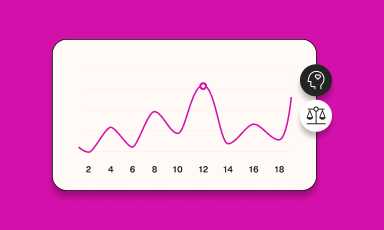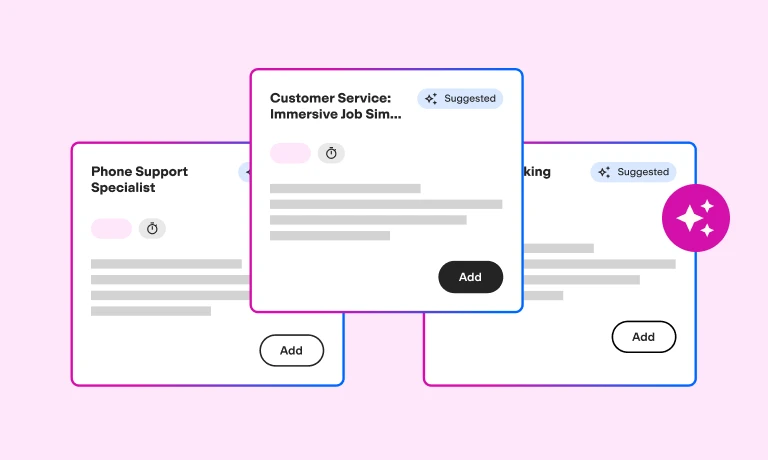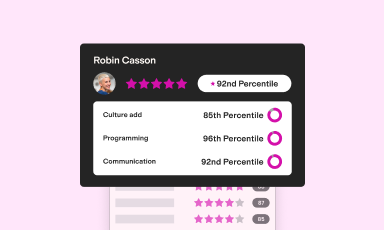Should you include Excel competency tests in your project manager hiring campaign?
Hiring skilled project managers can be the difference between success and failure. When a project manager lacks the skills required for the role, your business might suffer from delayed or failed projects.
Assessing project manager candidates, including their Excel competency, enables recruiters to hire the best talent and achieve desired business outcomes. Rather than stalled projects, you and your clients can look forward to results that exceed expectations.
In our guide, we’ll show you how to ensure you’re choosing the very best candidates with relevant tests like the Excel competency test that can make the difference between good and less-than-ideal hires.
What is an Excel competency test?
An Excel competency test evaluates a candidate’s ability to navigate and use Microsoft Excel for tasks relating to their role that require the use of spreadsheet software. This includes data management and the use of formulae and specific features to perform well on the job.
For project manager roles, Excel competency tests help identify whether candidates can effectively use Excel functions and features including PivotTables, Gantt charts, conditional formatting, sparklines, scenario manager, and more.
Why are Excel skills important for project managers?
Not every project management role will have the same requirements, but they’ll all involve familiarity and skill with Microsoft Excel in some capacity.
Specifically, project managers need proficiency in Excel for:
Efficient data organization. Project managers need to structure and organize project-related data, including budgets, schedules, resources, and task assignments. Excel Tables and the PivotTables function can help summarize large data sets to facilitate better decision-making.
Effective financial management. A project manager’s role is also heavily focused on financial matters throughout the project life cycle. They need to be able to develop and manage project budgets, track project expenses, forecast costs, generate financial reports for the higher-ups, and avoid budget overruns. With solid Excel skills, project managers can do all this.
Scheduling and planning. Excel enables project managers to create schedules, Gantt charts, and timelines. Conditional formatting helps them allocate resources, set and check project milestones, monitor deadlines, and identify overdue tasks.
Risk assessment and mitigation. Project managers can identify potential project risks and create risk registers with Excel. The software’s scenario manager helps them to generate and compare most likely, best-case, and worst-case project scenarios, and use the outcomes to adjust schedules, budgets, and resource allocations.
Reporting and communication. For reporting, project managers can craft visualizations to help communicate project statuses, progress, and key metrics to stakeholders as clearly and concisely as possible. Excel’s sparklines – small, condensed charts – are ideal for this.
Resource allocation and optimization. With Excel, project managers can track and manage their resources – including their team members, equipment, and materials. This is especially critical when managing multiple projects. The solver add-in Excel program is a must, but the scenario manager feature comes in handy here as well.
Task tracking and monitoring. Project managers also need to track tasks, and solid Excel skills help them do this. Task lists within Excel help with progress tracking and project dependency management, ensuring activities are completed on time and within a project’s scope.
Quality control and issue management. No project is truly successful without quality control, which managers must monitor regularly while correcting any issues. Within Excel, they can use sparklines to track task progress and ensure the project is hitting key metrics.
The best insights on HR and recruitment, delivered to your inbox.
Biweekly updates. No spam. Unsubscribe any time.
The benefits of using Excel competency tests when hiring project managers
If you’re debating using Excel competency tests in your project manager hiring campaign, take a look at the following benefits to help you decide.
1. Precise technical skill assessment and evaluation of quality candidates
Excel is a fundamental tool for project management. The results of Excel competency tests give you a picture of candidates’ technical proficiency – ensuring they can handle data, budgets, schedules, resource allocation, and reports in the most effective way possible. Mis-hiring candidates who lack the required Excel proficiency can end up wasting valuable company resources.
Additionally, Excel competency tests may help you find those candidates who would otherwise slip through the nets of recruiters using more traditional hiring methods, such as referrals or industry experience, which isn’t always a good indicator of role fit.
2. Tailored, efficient screening process
Assessing all candidates enables recruiters to set benchmarks and quickly discover their shortlist.
If a candidate can’t use basic Excel functions to create reports or manage project-related data, they’re probably not right for the role. Meanwhile, recruiters can focus on selecting candidates based on more meaningful role-related criteria, like whether they can use PivotTables to organize data, or sparklines for reporting.
3. Reduces subjective evaluation
Competency tests are a great way for recruiters to assess candidates' abilities without subjective judgments, which isn’t always possible with interviews alone.
Excel competency tests keep hiring decisions consistent and fair when they’re based on candidates' technical capabilities – like the ability to track task progress with Excel’s sparklines feature or use the scenario manager function for what-if scenarios – rather than solely on personal assessments. This helps encourage data-driven decision-making and establish benchmarks for what the role actually requires.
4. Role alignment
Data analysis, budgeting, scheduling, and reporting are key components of most project management roles and are often best achieved with Excel.
With an Excel competency test, hirers ensure that project management candidates can perform key responsibilities like financial analysis, creating Gantt charts, and generating project reports in real-world scenarios.
Meanwhile, the test enables candidates to have an understanding of the role’s expectations and the skill level required.
5. Efficiency boost
Project managers with pre-established excellence in Excel can do the job more efficiently than those who lack these fundamental skills. The knock-on effect of hiring effective project managers is streamlined project workflows, smoother project execution, and higher organizational output. Successful project delivery – within scope, budget, and time constraints – means more business growth and success in the long run.
Hiring candidates already proficient in Excel enables businesses to focus on equipping new project managers with more specialized project management competencies. This is ultimately a win for you as a recruiter because you’ve made the best hires, and great for candidates upping their skills and the companies training them.
6. Perfect for combo assessments
Use the Excel competency test in tandem with personality tests – like 16 personalities and DISC – for a holistic view of candidates. This helps you to see how prospective project managers will fit into your business and its culture.
Online tests are also ideal for evaluating candidates remotely, enabling your company to embrace hybrid and remote work models. Plus, in-person interviews aren’t ideal for every organization, but that doesn’t mean companies should skimp on the quality of the hiring process. For example, don’t forget to ask these 69 questions when interviewing your project manager candidates.
Evaluate candidates’ Excel skills with TestGorilla
TestGorilla offers different Excel tests you can use to evaluate your project manager candidates (or candidates for any other role, for that matter).
You can use one or a combination of these tests, depending on what your hiring team needs:
TestGorilla’s Microsoft Excel (general) test identifies project managers who can navigate basic Excel functions to optimize data management and analysis – perfect for the core project manager functions of financial management, reporting, and tracking both individual tasks and whole projects.
Our Microsoft Excel (advanced) test is perfect for roles involving highly specialized projects where managers will likely need a wider array of Excel functions at their disposal, which may include scenario managers for advanced risk assessment and sparklines for quality management.
Data Analytics in Excel test evaluates a candidate’s ability to perform a range of data analysis tasks. This screening test will help you hire experts who can implement Excel functions and formulas, employ data validation skills, and create visuals.
To test your potential project managers as deeply as possible, consider pairing Excel competency tests with 100 basic Excel interview questions or 50 advanced Excel interview questions. Not all project management roles necessarily need advanced tests and technical interviews, but having the option gives you maximum flexibility.
Combine Excel competency tests with other TestGorilla assessments
By using the Excel competency test to evaluate incoming project managers, you can avoid the mis-hires that take projects off track and cause companies to lose money and clients – disasters for any business. Use a data-driven approach to ensure that project management candidates are competent enough to manage data and finances, organize and monitor tasks, report efficiently, and keep projects on course.
TestGorilla helps you hire the best project managers in the market with its multi-measure approach. Pair the Excel competency test with other technical, soft skills, or personality tests for a holistic view of candidates.
Explore TestGorilla’s extensive test library for Excel competency tests and many others like it. Start hiring project managers who’ll help your company flourish with a free TestGorilla account. Book a free live demo or take a product tour to find out more.
You've scrolled this far
Why not try TestGorilla for free, and see what happens when you put skills first.


















